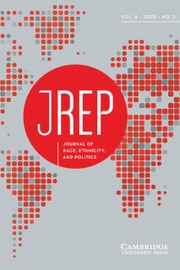Article contents
Conditional Representation: Presidential Rhetoric, Public Opinion, and the Representation of African American Interests
Published online by Cambridge University Press: 26 April 2016
Abstract
Conventional theories of presidential representation suggest that presidents avoid courting African Americans for fear of alienating white voters, leading to the underrepresentation of “black interests.” We argue that presidential representation of black interests is conditional: when (1) African Americans prioritize issues other than economic redistribution and civil rights and (2) when these priorities overlap with those of whites, presidents should provide considerable representation of those interests. We test our theory using two new sources of data: a dataset of black and white perceptions of the US's most important problem between 1968 and 2012; and a quantitative content analysis of over 200 major presidential speeches from 1969-2012. We find that presidents provide substantial representation of black interests, but only when these interests center on non-racialized concerns and overlap with the priorities of whites. We also find that presidential priorities are often independent of the chief concerns of both African Americans and whites.
- Type
- Research Article
- Information
- Copyright
- Copyright © The Race, Ethnicity, and Politics Section of the American Political Science Association 2016
References
REFERENCES
- 5
- Cited by


